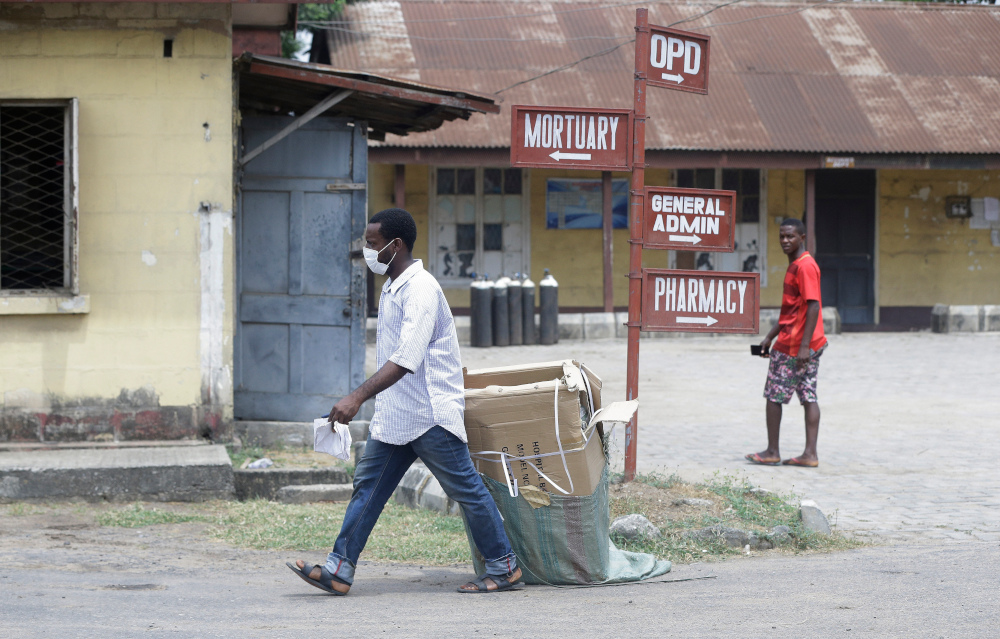
A man wearing face mask walks at the Yaba Mainland hospital where an Italian citizen who entered Nigeria on Feb. 25 from Milan on a business trip, the first case of the COVID-19 virus is being treated in Lagos Nigeria Friday, Feb. 28, 2020. Nigeria's health authorities have reported the country's first case of a new coronavirus in Lagos, the first confirmed appearance of the disease in sub-Saharan Africa. (AP/Sunday Alamba)
Amusement parks, sports events, religious gatherings, even school. More and more things in a growing swath of the world are now affected by the new virus. And that's messing with global financial markets as basic business, trade and tourism suffers from the disruptions.
Here are some of the latest developments:
THE DANGERS OF AMUSEMENT
While parts of China had already banned fun events, the damage to the rest of the entertainment world is spreading as fast as the virus. Disney closed its parks in Tokyo for two weeks, after doing the same in Shanghai and Hong Kong. South Korea exports entertainment worldwide but is shutting down its own shows, as K-pop superstars BTS called off an upcoming concert series in Seoul. Green Day did the same. Formula One teams are worried about being able to travel to races with the season set to start in two weeks. And the Swiss government is banning any events involving more than 1,000 people. The biggest victim: the annual Geneva International Motor Show, one of the car industry's showcase events.
IS AFRICA NEXT?
The virus has now officially reached sub-Saharan Africa, as Nigeria reported its first case. The patient is an Italian traveler who recently arrived in Lagos, Africa's largest city — home to 20 million people. Isolated cases of the virus were confirmed in Egypt and Algeria in north Africa in recent days, but there is growing concern that cases around Africa are going unreported. When the World Health Organization declared this virus a global health emergency last month, it was precisely because of worry that it could hit countries with weak health systems. And that's increasingly what's happening, from Africa to Afghanistan and beyond.
AS MARKETS FALL, ARE JOBS NEXT?
Down, down, down. From Tokyo to Frankfurt and New York, markets just kept dropping and were heading toward their worst week since the financial crisis in 2008. A growing number of major companies are issuing profit warnings and say factory shutdowns in China are disrupting supply chains. Germany's DAX skidded more than 5%, Tokyo and Shanghai closed 3.7% lower and New York markets looked set for more losses Feb. 28. With the virus confirmed in nearly 60 countries and travel and trade curtailed, companies are facing tough decisions. British Airways warned of a hit to its earnings as people put off or postpone trips. Philippine Airlines is laying off 300 ground personnel as part of an ongoing restructuring that was aggravated by travel restrictions caused by the virus. Some airlines in Europe canceled flights due to reduced demand. U.S. President Donald Trump has been in touch with CEOs amid worries it could weigh on the election campaign.
SUPERMARKET RATIONING
The panic-driven shopping that first cleared shelves in Asia last month has made it to Europe as uncertain consumers stock up. Czech online supermarket Kosik.cz is starting to limit the maximum weight and number of items per delivery. While the Czech Republic hasn't reported a single case of the virus, some individual shoppers recently bought a half ton — or more — worth of merchandise. Suppliers can't keep up with the spike in demand, which is even higher than during the Christmas shopping season. So Kosik.cz is now imposing a 50-kilogram (110-pound) limit per delivery, arguing that's plenty for a single household.
MASK MADNESS
More than anything else, shoppers want to buy masks. Good luck trying to find one. Demand has exploded — even though experts say most people don't need to cover their faces. Compounding the shortage, supplies also are down because as many as a half of all surgical masks are made in China. As false rumors ignite social networks, shoppers have emptied store shelves around Asia of toilet paper and napkins in the belief they could be used as improvised masks. Even the fashion-conscious are caught up in the mask madness. Some attendees donned them for ready-to-wear fashion shows in Paris this week. One designer sent models down the runway wearing masks matching their clothes. Doctors say washing your hands offers more sensible protection.
SHIFTING SPREAD
While it appeared to start in China and has hit Chinese people the hardest, the virus is now spreading all kinds of ways. South Korea's daily virus toll is now higher than China's. Iran now has more deaths than anywhere outside China. Italy's numbers jumped to more than 800. From California to France and beyond, more and more cases are appearing with no obvious source. And that's also shifting the reaction. Governments are expanding travel warnings, even for allied countries. Health authorities in one Dutch province want to cancel public events at which Dutch and German residents mix because of the growing number of cases in neighboring Germany.
Advertisement







